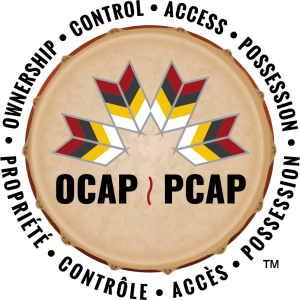Understanding OCAP®

The First Nations principles of OCAP® establish how First Nations’ data and information will be collected, protected, used, or shared. Standing for ownership, control, access and possession, OCAP® is a tool to support strong information governance on the path to First Nations data sovereignty. Given the diversity within and across Nations, the principles will be expressed and asserted in line with a Nation’s respective world view, traditional knowledge, and protocols.
If you work with First Nations, consider how you interact with First Nations data.
OCAP® asserts that First Nations alone have control over data collection processes in their communities, and that they own and control how this information can be stored, interpreted, used, or shared.
Ownership refers to the relationship of First Nations to their cultural knowledge, data, and information. This principle states that a community or group owns information collectively in the same way that an individual owns his or her personal information.
Control affirms that First Nations, their communities, and representative bodies are within their rights to seek control over all aspects of research and information management processes that impact them. First Nations control of research can include all stages of a particular research project-from start to finish. The principle extends to the control of resources and review processes, the planning process, management of the information and so on.
Access refers to the fact that First Nations must have access to information and data about themselves and their communities regardless of where it is held. The principle of access also refers to the right of First Nations’ communities and organizations to manage and make decisions regarding access to their collective information. This may be achieved, in practice, through standardized, formal protocols.
Possession While ownership identifies the relationship between a people and their information in principle, possession or stewardship is more concrete: it refers to the physical control of data. Possession is the mechanism by which ownership can be asserted and protected.
Tools and resources to support the application of OCAP® can be found below, and at our Online Library.
Learning about OCAP®
When considering the knowledge and skills needed to support strong First Nations’ information governance, we start with the question, “What is your relationship to this information?” First Nations and their community members can apply the OCAP® principles to promote good information governance and assert their sovereignty. It is the role of all those who work with or seek to work with First Nations to understand and respect OCAP® and First Nations’ rights to control their own information.
FNIGC offers a variety of education and training options to meet these needs. To learn more about OCAP®, The Fundamentals of OCAP® online course provides a foundation in OCAP® and introduces knowledge that can be translated into practical skills in a variety of settings.
It is important to remember that completing the course is not a license or an endorsement of anyone’s work. But it is a great place to begin a journey to good information governance and data sovereignty, and to understand your role on that path.
Interested in learning more about the First Nations principles of OCAP®?